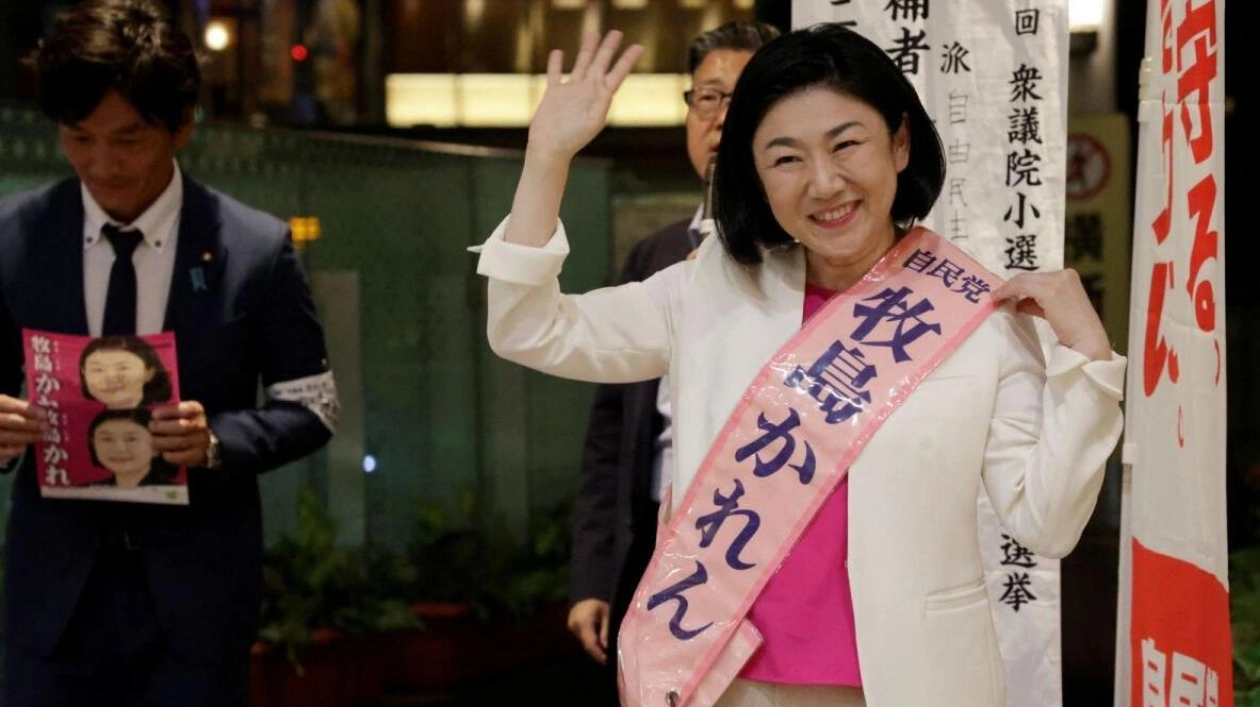Karen Makishima, a candidate from the Liberal Democratic Party (LDP) for the upcoming general election, greeted residents on the first day of her campaign in front of a train station in Odawara, Kanagawa Prefecture, Japan, on October 15, 2024. – REUTERS
Karen Makishima stands as the sole female candidate representing Japan's ruling party in her 20-seat prefecture for the October 27 general election, highlighting the challenges women face in penetrating the country's predominantly male political landscape. The LDP has vowed to reduce one of the largest gender gaps among lawmakers in democratic nations, yet despite a record number of female candidates, it and other parties are unlikely to meet the government's target of 35% female lower house candidates by 2025. While surveys indicate societal attitudes towards women in Japan pose a barrier, some critics argue that the LDP, which has dominated post-war politics, lacks genuine commitment to narrowing the gender gap, citing its failure to adopt more robust measures.
Only 16% of LDP candidates in the upcoming election are women, compared to 22% for the opposition Constitutional Democratic Party of Japan (CDPJ), according to a Reuters analysis. Although gender inequality may not be a primary concern in the snap election, the scandal-ridden LDP, which also faces an upper house poll by July, requires every vote, from both men and women, as polls suggest it may lose its long-held majority. While delivering stump speeches and posing for photos in her coastal Odawara constituency, approximately two hours from Tokyo, Makishima told Reuters that female candidates struggle against societal perceptions that the demanding nature of Japanese politics is unsuitable for women.
"The greatest disadvantage of having a low number of female legislators is that it perpetuates traditional views, such as the belief that women are not suited for politics," Makishima said. Japan's persistent gender gap issue has become an international embarrassment. According to a 2024 G7 report, Japan currently has just over 10% female lawmakers in its lower house, compared to an average of 30% in other G7 advanced democracies. It ranked 118 out of 146 countries in the World Economic Forum's gender gap report for this year.
Last year, the LDP set a party target of 30% female lawmakers by 2033, but some gender equality experts argue that the party needs more concrete plans, such as gender quotas. "The LDP's dominance is a key reason why there are so few women in politics," said Emma Dalton, a senior lecturer at Australia’s La Trobe University, who has studied gender inequality in Japan. Some LDP lawmakers agree that more decisive action is needed. Tomomi Inada, a former defense minister, told Reuters that the party should consider implementing a quota system or outlining a detailed plan to achieve its 30% target by 2033.
In response to Reuters' questions, the LDP stated it has no plans for quotas and limited scope to increase female candidates due to many seats being held by incumbents. While parties must support women in politics, "a shift in societal attitudes is also necessary," the LDP said. Issues facing women in Japanese politics include gender stereotypes, difficulties balancing family responsibilities, and harassment, according to a 2021 government report.
"When I’ve been out campaigning, people have kicked my signs, and when I have responded to discriminatory remarks, some people have said, 'how dare a woman talk back!'" said Harumi Yoshida, the shadow minister for gender equality in the main opposition CDPJ. Nearly 60% of female respondents in a 2020-21 survey of over 5,000 local lawmakers reported harassment from the public or colleagues, compared to a third of male respondents. Earlier this month, newly-appointed Prime Minister Shigeru Ishiba unveiled a cabinet with just two women, which a rights group called a "clear backslide" in gender parity efforts. The CDPJ's shadow cabinet had eight.
In a letter to LDP leadership, Inada and a group of female lawmakers argued that the low number of women in parliament "distorts democracy itself." The letter recommended improving gender parity by ranking women higher on lists of non-constituency candidates selected by proportional representation. A Reuters review of these lists found they were mainly dominated by men. The LDP noted that a record 39% of its candidates on the lists were female but declined to comment on their ranking.
Despite this, Makishima, who won her seat by a significant margin in 2021, remains optimistic about broader change. "We are in a transitional period," she said.
Source link: https://www.khaleejtimes.com






